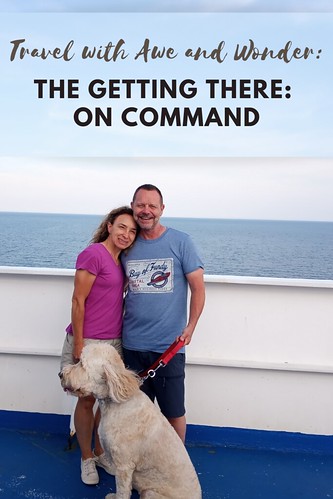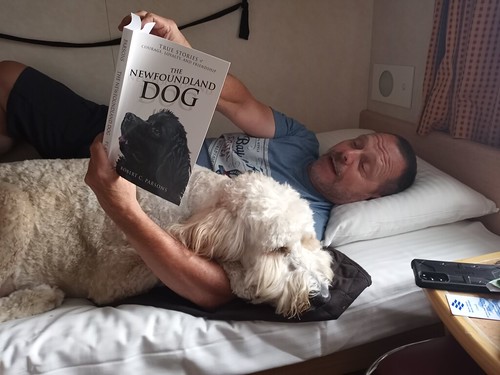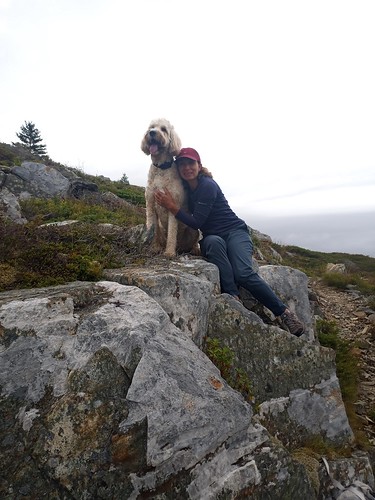Travel with Awe and Wonder: Getting to Newfoundland Part Three: On Command
This summer, my husband and I undertook a move. A relocation from Massachusetts to Arizona has been undertaken by others, no doubt. We decided to make things a little more interesting than a direct route. We headed north. Our circuitous route is winding us through Newfoundland, Portugal, and North Carolina. When one would think to take the southerly route from the Carolina’s to Arizona in the winter months, we will make Bugs Bunny’s famous right turn at Albuquerque to get to Bozeman, Montana. Then, we’ll drive to Arizona. Our 100 pound Golden Doodle, Kipper, was not consulted in the making of these plans, but we plied him with treats for the first three years of his life to the point he considers us his pack and blindly follows our direction. Our two sons weren’t consulted either. But, given that they abandoned us in their selfish quest to get a college education, we felt at liberty to leave a note on the front door explaining why other people now live in their house.

Day three started with a several hour drive to a several hour wait for our overnight ferry from North Sydney, Canada to Argentia, Newfoundland.
Kipper soon became the star of the show in the waiting room of the ferry terminal and on the ferry.
He was TERRIFIED, which made him a really nice, calm dog that stuck by John's side, sometimes literally leaning on John's leg or resting his head on John's lap for long stretches of time—so that any number of little hands on squealing children could stroke him.
We paid for a dog-friendly cabin, big enough for a large dog and two humans to walk in forward, but not big enough for a 100-pound dog to turn around or for humans and 100-pound dog to move past each other without one of the three of us climbing into the bottom bunk to allow for the exchange of positions. At this point, Kipper had barely eaten in several days, making us less nervous that he would regurgitate anything due to seasickness.

Comforting bedtime stories
The other thing Kipper didn’t do for the 14-hour ferry ride and the three hour wait before the ferry ride was pee. The Marine Atlantic Ferry is wonderfully accommodating to dogs and has a “dog-friendly” part of the upper deck, complete with signage and a painted line to section off the area where dogs can relieve themselves.
I walked Kipper around that area many times and he LOVED it! Sniffing and wagging, back and forth all around, unable to choose which scent to follow first.
Should I go here or maybe over there, but I don’t want to miss that scent up ahead, the one behind me is interesting, too.
Back and forth, crossing and tangling the leash in an attempt to gather every odor into his olfactory-focused universe before that lady at the end of the rope gives up and drags him away.
Kipper is chronically disorganized. To make 100 pounds of a dog worse, a trainer we employed diagnosed him with “Reactive Disorder.” I am new to dog ownership. I read that it is often good for an owner to have a word or phrase the dog associates for command peeing. “Go pee” or “empty” are a few commonly used. I tried this in Kipper’s early training. After arriving home from work seven hours after leaving Kipper, I would immediately take him out to pee—and knowing he would really need to go I started using a command word, “Pee,” to trigger association. After waggily greeting me, Kipper would run out desperate to relieve himself. Leg lifted ready to go. “Pee,” I would say at that strategically associative moment. Kipper would look at me, stop any start to the flow, drop his leg, and run his bladder-filled self to get a toy from the yard. He would try to play for a moment and with tears about to stream down his face from holding it all day, he would start to assume the pee position again, at which point I would say “pee” to get him accustomed to the word for those times I needed him to pee on command.
Again, he would stop (and almost whimper) to go fetch a yard toy. After weeks of trying the on command word and having Kipper, in mid leg-lift, look at me in pained disbelief that I would really want him to fetch that toy at that very second, I realized that Kipper needs way LESS stimulus in order to do what most dogs do when nature calls.
Now when I take Kipper out to pee before bed, I am silent—and if any woodland creature makes the slightest pip of a sound or a gentle breeze wafting with notes of oak or leathery tannins crosses his nostrils, we have to go inside and start the whole darn thing over.
Needless to say, the doggy pee deck on the Marine Atlantic did not work for us.

After several failed pee attempts
The Marine Atlantic Ferry was actually lovely, with good food and people who seemed so excited to talk about their life on The Big Rock or their plans for traveling during their visit. We met: native Newfoundlander Linda, a really happy guy on top deck going to visit his son, a forestry school graduate and her boyfriend, a guy and friend motorcycling to friend's deceased wife's family to pay homage to her, and, our favorite, the multi-summer vacationer Mark, who was enjoying this summer in Newfoundland by transporting his dead sister-in-law across the border for burial. (He asked us to keep that part of his trip on the low-down. He hadn’t really checked the regulations on dead in-law transport.)
Mark was the first person who approached us, face full of smiles and ready for some sitting-around-a-campfire style swapping of stories. Kipper and I happened to be in the Marine Atlantic Ferry terminal building while John sat in the Jeep in our assigned lane in the parking lot behind other cars, campers, and trucks that were waiting to drive onto the ferry.
John said that Mark actually knocked on the car window. John, thinking he had done something wrong in his parking placement, rolled down the window…at which point, Mark said, “I see you’re from Massachusetts.”
Being from The States is how many of the conversations we’ve had with Canadians have begun. But, some just start out of thin air. Take for instance, the happy guy on the top deck of the ferry. In passing him on the deck, he said, “Isn’t it nice to have time to take in the water?” Scanning my surroundings and realizing he could only be talking to me for absence of any other latin-derived language-speaking creature in the near vicinity, I responded. We had a lovely conversation about several joyful morsels of our individual lives. Then we parted ways, carrying our brief, satisfying connection with us.
We’ve had many of these types of exchanges since crossing the border into Canada. The people don’t seem lonely. They seem kind.
These people just came up and talked. Nice-like and friendly. Interesting and interested. Joyful and pleasant. It's like they were REALLY listening in kindergarten. I think if any of these people saw the colorful posters or t-shirts that are popular in the U.S. these days directing people to "Be Kind," they would be confused, as if the poster or t-shirt stated "Eat Something Today."
Let’s not overgeneralize.
There are Newfoundlanders that don’t go out of their way to connect. We’ve had our car bumper ridden too closely. We’ve had gruff salespeople wordlessly point in the direction of an item we requested. There are probably even Newfoundlanders who are overtly mean. We haven’t met any, but then again they probably aren’t the people who are going to knock on your closed car window to get chatty.
All manners of people exist in all countries. And sometimes it's just the day that particular person is having. We are hearing more and more about the overwhelming kindness the people of Gander and the surrounding communities bestowed upon the thousands of people stranded when the airways into the U.S. were closed following 9/11. These are all true and utterly commendable!
The people of Newfoundland are a proud bunch without arrogance. They are proud of their heritage. Proud of their fortitude. Proud of the beauty of the great land on which they live. And proud of their kindness to guests, strangers, refugees, and passersby.
But let’s not put too much pressure on all Newfoundlanders to shine the wide-eyed, toothy grin of Spongebob on us at every turn. Would people in the U.S. respond the way the people of Gander did? Some would with a single gesture of kindness. Some would with many gestures. Others wouldn’t. Not because we are Americans or they are Canadians. Because we are people who have different reasons and motivations for doing things or not doing them.
I just want to remember that in this long (and sadly, short) life, to try to tip my scale more heavily on the side of kindness and judge less when I or others aren’t. And realize that in its essence, kindness is an act of unrequested graciousness, not to be ordered by a t-shirt slogan or made to be a guilt-ridden suggestive comparison. Once something is requested, it is no longer kindness, but duty. It’s what makes kindness so special. It is unexpected. It is freely given. It is often spontaneous. It is a choice. It doesn’t happen all the time. Kindness is only kindness when unsolicited, not on command.

Please click the photo below for a collection of my Travel with Awe and Wonder columns:
Christy Anselmi, the Travel with Awe and Wonder Editor for Wandering Educators, taught kindergarten and first grade for 13 years in public schools in Atlanta and Massachusetts. She took a two year diversion to teach and learn in a Montessori school in Bozeman, Montana and a 10 year sabbatical to raise her own children. Christy has an abiding interest in early childhood education and how to provide developmentally appropriate experiences to engage young people in connection and communication. Raised by parents who got Christy involved in travel at a young age, she developed a curiosity about what is around each corner. Married to a Wyoming man who developed his own wanderlust after years in the Army, the two (along with two sons) have lived in five states (Georgia, Montana, Utah, Kansas, Massachusetts, and soon to be Arizona) and one country (Germany). Christy is a life-long noticer of intriguing scenarios, phrases, and ironies in everyday life. Finally putting pen to paper, she has a growing passion for insightful travel-experience writing.



















